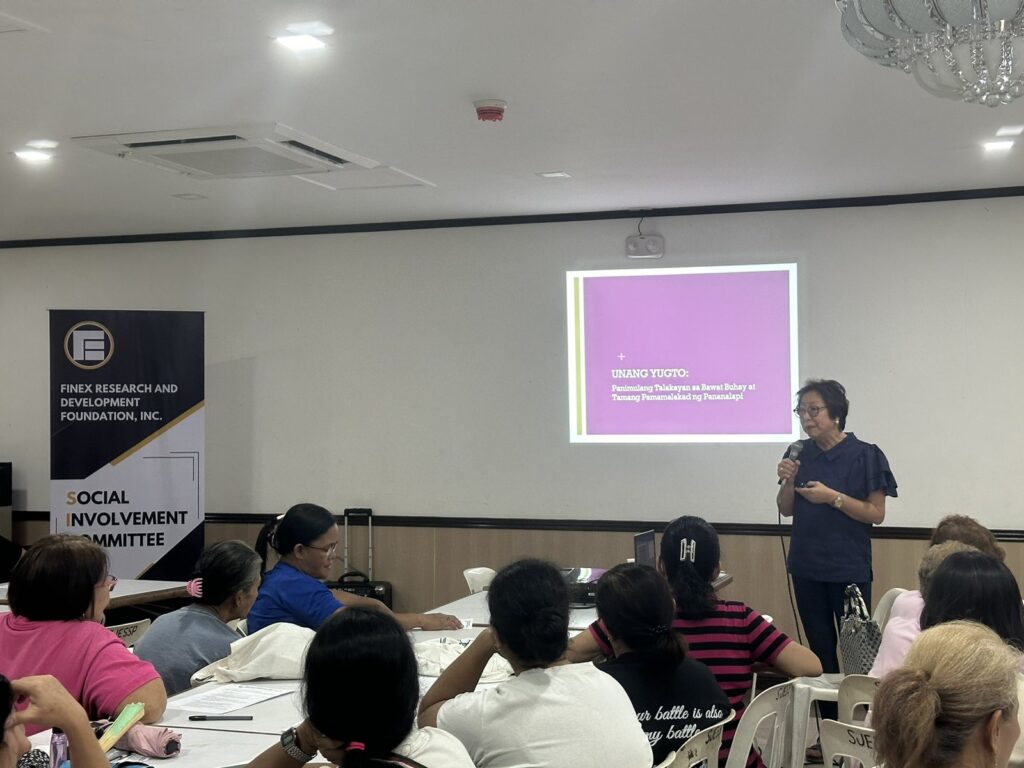
Ronald S. Goseco l 16 August 2024 l The Manila Times
One of the advocacies of FINEX is the Financial Literacy Program that is being run by the Social Involvement Committee. This program tries to address one of the reasons why many Filipinos remain poor. This article describes the cycle of poverty and how financial literacy could play a key role in alleviating it.
According to the latest survey conducted by the Social Weather Stations (SWS) last March 2024, 46 percent of families said they were poor and 33 percent said they were in the borderline. This 46 percent translates to around 12.9 million families in the country. The SWS said that the families who thought themselves poor was the highest in the Visayas, followed by Mindanao with the balance in Luzon outside of Metro Manila. What is an alarming situation if that based on the SWS survey of December 2023, the number of Filipino families who experienced “ involuntary hunger” rose to 12.6 percent. According to SWS, “involuntary hunger” pertains to experiencing hunger and not having access to food at least once in the past three months.
This poverty situation is the reason why FINEX has rolled out its financial literary programs. These were spearheaded by two outstanding and unassuming ladies: Conchita “Chit” Manabat and Carmen “Menchu” Serina. Chit is the founding trustee and President of the Development Center for Finance. She was a past president of FINEX and was Chairperson of the International Association of Finance Executives Institute (IAFEI). In 1997, she also founded the accounting firm bearing her name that got the representation of Deloitte Touche Tohmatsu. Menchu Serina is President of Vantage One Financing Corp. She is the Chairperson of the FINEX Social Involvement Committee. She was the key figure in organising the various financial literacy programs that are being run all over the country by volunteers that she personally recruited and trained. At the start, she practically conducted all the lectures herself and in so many instances would actually lose her voice.
In the course of these lectures and travels around the country, we observed the struggles of the poor to build wealth. The main reason is the poverty trap which is a cycle of limited opportunities which makes it difficult for families to escape their financial predicaments. These families struggle and remain impoverished because they lack access to quality education, healthcare and social networks that could provide better opportunities. Without these resources, entire families are unable to develop the skills, knowledge and connections necessary to secure good jobs or start successful businesses. This lack of a financial cushion also means that when a medical emergency or a job loss arises, this can have devastating consequences further reinforcing the cycle of poverty. The burden of inflation and high costs of living also makes it extremely difficult for poor families. They often allocate most of their income to necessities like food, housing and transportation leaving little room for savings. We also observed that lifestyle inflation also plays a role even for those holding seemingly stable jobs in government like uniformed personnel. As their income rise, there’s often pressure to increase spending on non-essential items, reducing the potential for savings and investment This has been exacerbated by the ease and allure of online shopping specially on double dates like 8/8 or 7/7. This trend combined with inflation driven costs and debt has created a perfect storm.
It was very clear that the knowledge gap that is holding so many back is the lack of financial literacy. It was because of this that Menchu Serina and Chit Manabat decided to double down on the programs offered by FINEX. They decided that this is where we should exert our efforts for the greatest impact to alleviating poverty, one Filipino family at a time. Financial literacy is critical in wealth building but it remains a challenge for poor and middle class families. The lack of comprehensive financial education in schools and communities leaves many adults ill-prepared to make informed decisions about budgeting, saving, investing and managing debt. Common misconceptions abound such as believing that all debt is bad or investing is only for the wealthy is quite common. Many families also lack basic financial skills such as creating and sticking to a budget or evaluating investment options. To make matters worse are the rising threats from scams and fraudulent financial schemes that have victimised so many with get- rich quick offers.
The challenges facing the poor are multifaceted and interconnected. The issues require comprehensive solutions from addressing the poverty trap and developing financial literacy to other factors like lifting systemic barriers. Addressing these challenges require a lot of interventions from all of us to create an equitable and just society. Meanwhile, the programs that Chit and Menchu created are slowly making a substantial dent in the right direction in fighting the cycle of poverty in our country.
===
Ronald Goseco is FINEX Foundation Trustee.
The views and opinions expressed above are those of the author and do not necessarily represent the views of FINEX. His opinions are his own.
